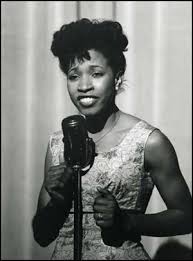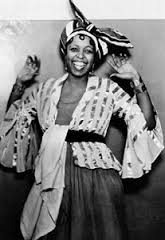I spent some time researching artists that arose from Topsy’s influence on black entertainment. I was struck by the similarities between the upbringing of Ethel Waters and Topsy. In her autobiography, Ms. Waters talks about growing up, saying, “I never was a child. I never was coddled, or liked, or understood by my family. I never felt I belonged. I was always an outsider.” The same loneliness seemed to run like a thread through Topsy’s story, but there’s more! Ethel Waters did not have a relationship with either parents, and lived with her alcoholic aunts. From them, she learned to tell a story through song. Later, living with her sisters, she witnessed quite a few heavy moments, all of which required her to grow up quickly. Ethel, having endured much trauma, was able to keep her head on straight working as a chambermaid. There isn’t an exact alignment in stories here, but keep reading.
In a 1927 film version of Uncle Tom’s Cabin, there was a deleted scene in which Topsy was in Miss Ophelia’s room, putting on “white face”. Why the scene was removed, is unclear, BUT, it is striking in it’s presentation of Topsy. I haven’t seen such a deliberately ugly character since Nanny McPhee. I was appalled at her hair, clownish facial expressions, grotesque features (my doll will be nothing of the sort)… In the scene, Topsy is putting white powder on her face, taking delight in her new (whitened) image. Miss Ophelia walks in and catches Topsy playing. She looks up sheepishly and the following words stretch across the screen, “Please, Miss Feely, I jes’ wanted to make myself white — so I could be good like Missy Eva.”
THIS scene mirrors another scene coming straight from Stowe’s pen: “On one occasion, Miss Ophelia found Topsy with her very best scarlet India Canton crape shawl wound round her head for a turban, going on with her rehearsals before the glass in great style (212)
BUT, here’s the more part: Ethel Waters wrote about the same moment in the mirror in her autobiography, Eye is on the Sparrow, “I had the most fun at the Harrod Apartments, on the days when I substituted for one of the chambermaids. I was allotted half an hour to make up each room but soon became so efficient that I could finish the work in ten minutes. Then I’d lock the door, stand in front of the mirror and transform myself into Ethel Waters, the great actress.”
Jayna Brown describes this sort of moment by saying of Topsy, “Topsy casts off the domestic harness and transforms herself in the space of labor, reclaims her body in the place of work.” In the same the way, Ethel Waters is reclaiming her body by creating a character for herself in a place were she labors with no face, with little sense of self. This reminds me of a previously posted picture of Kara Walker’s reimagining of Topsy holding a watermelon, looking like an angel.
What I’m trying to get at is quite obvious but shouldn’t go without being said. The power of visual representations has been evident in every facet of my research. Makes sense, I guess. Sight allows us to visually connect with everything around us. It is the key to the worlds we inhabit, real and imagined. Therefore, what we see dictates how we feel, what we believe, creates memories, impression….
I want this doll that I be representative of what Topsy would have seen in her “Ethel Waters mirror moment”- someone beautiful, confident, and free. It’s funny to think that in the mirror, even when you are playing, what you see is yourself. Even if it’s a different self, it is still the self. Everything you want to be, you already are but I digress.
Topsy’s doll will be a realization of the self she was never allowed to be unless she was pretending. That’s also a funny thought because throughout much of the book she is doing just that, pretending. Ethel Waters went through the same emotions, but she had her moment to shine. This doll is my attempt to create Topsy’s diva persona. Maybe then she’ll have a shot at a career like Ethel’s . Her debut will be as a lovable little doll that’s hugged and tucked in at night. In her mansion, she’ll have drawers full of clothes, a piano to write songs, and other little chocolate girls that comment on how nice her hair looks. I hate that this was not her reality- that in the world of the novel she has none of this From people like Ethel Waters, folks who lived a life just like Topsy, we do find triumph. That gives me some hope.
Ethel Water is to Topsy as Diva is to Doll.



